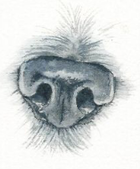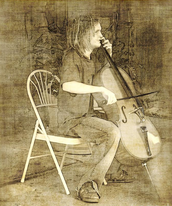 This collection of words that share a centuries-old root. What do you suppose the root meant? aware, beware, wary, & guard (the verb) As you probably guessed, the root word has something to do with wariness — these words all came from the Proto-Indo-European word *wer-, which meant to watch out for or perceive. *Wer- also gave us some words that define some of the things people might be wary of losing: wares, warehouse, & reward And some words that involve storing or protecting those wares: wardrobe, steward, reverend, warden, & guard (the noun) It even gave us the word lord, which in the lower case refers to he who guards the loaves & in the upper case can refer to a British noble, or in Christianity, God. Then there are *wer-’s offspring that help label how we might look up to those who watch over things for us: regard, revere, & reverence And what would we do without outliers? These unlikely words also grew out of this same fruitful root: hardware, panorama, avant garde, & software To confuse matters even more, this is only one of the four Proto-Indo-European *wer-s linguists have identified. The other three meant to cover, to bend, & to lift. Ah, Language. Nothing like it, eh? My thanks go out to this week’s sources, Merriam Webster, Collins Dictionary, yokostogut.blogspot.com, Etymonline, & Wordnik.
2 Comments
 Some people can’t sleep because of partying neighbors, indigestion, climate change, or national news. Others lie awake at night wondering how the word parabolic could possibly be related to the word parable. In case you fall in the latter category, here’s the answer… Parable, parabolic, parabola & parley all come from a Greek word constructed of para- (alongside) & -bole (a throwing, casting, beam, or ray). The original term literally meant a throwing beside, but parable’s primary application was its figurative meaning, a comparison. The word maintained that figurative meaning in Medieval times, when used in Late Latin to refer to stories told to make a point, parables that compared a fictional tale to real life with the purpose of teaching a lesson. After Medieval times, much study turned to science, & the word picked up its mathematical meaning. Above, you'll see a parabolic curve or parabola — still a comparison, not really a curve, but a collection of intersecting straight lines that appears to be a curve. As to the word parley, it grew from the earlier meaning, as most parables weren’t written, but spoken, so parley means to speak, talk, or confer. If anything about this Parable of the Parabolic Parley seems worthy of comment, please offer your remark in the comments section. My thanks go out to this week’s sources, Merriam Webster, Collins Dictionary, Etymonline, & Wordnik.  The word snout doesn’t strike me as a likely parent of many words. Wrong again. Snout showed up from early Germanic sources in English in the early 1200s, meaning trunk or projecting nose of an animal. The Scottish version of snout is snoot. It made its way back to English in 1861, meaning nose. Snore & snort appeared in the 1300s & 1400s respectively. Etymologists cite these words as coming from snout, but also as imitative words of the sounds they represent. In the 1300s snout gave us the verb snack, meaning to bite or snap. By the 1400s snack also became a noun meaning a snatch or snap. By the 1680s, the meaning a share or portion grew from the original noun meaning, & by 1757 snack began to mean a bit of food to be eaten hastily. In Old English, the word snafl was born of snout. It meant nasal mucus. In time, snafl became snyflan, which gave us both sniffle and snivel. Another snout-born Old English word referring to nasal mucus was gesnot, which by the late 1300s, morphed into our modern word snot. In German, the mother-word for snout gave birth to a word for snarl, which got applied to a breed of dog, & made its way into English in 1923 as the word schnauzer. All from snout — who knew? Please leave any snout-oriented thoughts in the comments section. My thanks go out to this week’s sources, Etymonline.com, Wordnik, Merriam-Webster, Collins Dictionary, & the OED.  Once upon a time (or so linguists believe) there was the word *wi-ro-. It meant man. Over the years it’s given birth to a disparate batch of word-children. One of those words is the noun virtue, which appeared in English about 1200, meaning moral excellence. It came from a Latin word meaning courage, manliness, high character. The following century saw the beginnings of the related word virtuous, meaning characterized by vigor, strength, or valiance. It took two hundred years for virtuous to mean having peerless moral qualities. And by 1610 another word was born into this family of words through Italian: virtuoso, originally meaning scholar or connoisseur, & shifting by 1743 to mean one with peerless artistic skill or talent. Two *wi-ro-born words many of us hope are being re-conceptualized in this MeToo era are virile & virility, meaning manly & manly strength respectively. Virile & virility showed up in the 1400s & 1500s through Latin & Middle French. When *wi-ro- made its way into Germanic languages, one branch of its meaning became generalized to the human race, human existence, or the affairs of life & became the Old English word world. After a few hundred years of wallowing about in the minds & usage of Old English speakers, it oozed through meanings like the world of humans, the physical world (as opposed to the spiritual world), & morphed its way into its many modern meanings, one of which is the earth. Another branch of this word continued to mean man in Old English. When Old English speakers added their version of *wi-ro- (man) to their word wulf (wolf) they came up with werewolf. Here’s hoping in the next few centuries as these words grow & adopt new meanings, they’ll encourage a bit more virtue, & virtuosity among all humanity & add some gentler, more flexible understandings to what it is to be a man — or for that matter, a human. Thoughts? Please sling them into the comments section. My thanks go out to this week’s sources, Etymonline.com, fineartamerica.com, Wordnik, Merriam-Webster, Collins Dictionary, & the OED.  Here's a handful of interjections, because sometimes you just have to interject. Yippee showed up in 1920, an expression of exultation. It may have come from hip (as in hip hip hooray). Dern (1830) & durn (1835) are American attempts to avoid the “swear word” darn, which was a 1781 American attempt to avoid the “swear word” damn. In popular usage, they all are an expression of anger, irritation, or contempt. Linguists believe darn may be an abbreviation of eternal damnation (mispronounced ‘tarnal damnation). If so, it’s related to the 1784 American interjection tarnation. Wow showed up from Scotland in 1510, & continues to express a state of delight or amazement. Its source is unclear. Ahem appeared in 1763, a lengthened version of the earlier hem, imitative of clearing of the throat. Ahem continues to be an expression of disapproval, embarrassment or an attempt to get others’ attention. Oh is a one-interjection-fits-all sort of interjection from the 1530s. Existing in many Indo-European languages, oh can be used to express nearly any emotion. This interjection gave birth to oh boy in 1910, oh baby in 1918, & oh yeah in 1924. Hey has been part of the language since 1200. Like oh, hey has many meanings. Some include an expression of derision, challenge, greeting, pleasure, surprise, warning, & anger. Mercy has been around as an English interjection since 1300. Though it originally was a shortening of may God have mercy, as a modern interjection mercy can express surprise, annoyance, fear, or thankfulness. Man has been used as an English interjection since the 1400s, originally expressing impatience, surprise, or emphasis, & today — like the much-maligned interjection dude -- man can mean almost anything. English is rife with interjections. If you’ve got a favorite “fit-to-print” interjection I missed in this very short list, please suggest it in the comments section. My thanks go out to this week’s sources, Etymonline.com, Wordnik, Merriam-Webster, Collins Dictionary, & the OED.  This time of year there’s a heap of Thank yous going on & a lot of you’re welcomes to boot. Thank you has been in English usage since 1400, and comes from Germanic languages from a Proto-Indo-European root meaning to think or feel. I love the idea that thankfulness is associated with something as basic as consciousness: simply thinking & feeling. There’s something to ponder in the new year. To my complete surprise, you’re welcome didn’t show up in English until 1907, though welcome has been in English usage since at least 600 AD. Back then welcome looked something like wilcuma. Old English speakers used this word to welcome guests with a kindly greeting. Welcome has two word parts: willa, meaning pleasure, desire or choice, & cuma, meaning guest. Etymologists translate wilcuma’s original meaning as greetings to one who suits my will or wish. May all those who visit you this season & in the coming year suit your will or wish, & may you find many an opportunity for heartfelt thank yous. My thanks go out to this week’s sources, Etymonline.com, Wordnik, Res.cloudinary.com, Merriam-Webster, Collins Dictionary, & the OED.  In this season of boxes with ribbons, let's consider the word box. Box takes up nearly three pages of the Oxford English Dictionary. It covers four pages if we include boxage, boxbed, boxed, boxing, and a few more related terms. It appears the first use of box referred to the box-tree or boxwood, and though modern boxwoods don't produce much usable wood, etymologists theorize that someone at some point made square containers out of boxwood, and voila! The box. At least twenty-four meanings/applications in noun form, spring from the container of wood meaning including jury box, box seats, box-barrow & box pleats. There are seventeen meanings of the verb box, including to contain in a box, to bleed, & to fight with fists. On top of all that, one of the more confining meanings of the word box inspired me to write a song (perhaps a talking blues?). I hope it offers food for thought. Big thanks to this week's sources, The OED, Etymonline, & Wordnik.
 For those moments in life when you just need a put-down that starts with the letter S: Schlemiel — a fool or bumbler — arrived in English in the 1860s from a Yiddish word which probably came from the name of a general involved in ill-fated battles & at least one ill-fated extramarital affair. Scofflaw — one who habitually ignores the law — arrived in English in 1923, as the winner of a contest posed by Delcevare King, who asked people to coin a word to define those who ignored the 18th amendment by drinking or making illegal alcohol. Scoundrel — an unprincipled knave or rogue - showed up in English in the 1580s. Though its origin hasn’t been pinned down, it may have come from a French word meaning to hide oneself. Shark — a predatory person or swindler — Appearing in English in the 1560s, shark may have come from a Mayan word meaning shark, however, many etymologists insist shark was initially applied as an insult to humans, probably from a German word meaning rascal. When it came time to put a name to a toothy, predatory fish, the word shark seemed to fit. Skinflint — a stingy, miserly person — showing up in English in the 1700s, skinflint defines an individual who is such a cheapskate, s/he would try to scrape skin off a piece of rock (flint) for profit. Slob — an untidy, loutish individual — slob appeared in English in the 1780s from a Scandinavian source, meaning mud & mire, & by the 1860s, it gained its modern meaning. Sluggard — a lazy person or idler — coming to English around the 1400s, probably from a Norwegian word meaning slow, it originally applied to slow-moving people, boats, & animals. Stooge — an incompetent underling — arriving in English in 1913 meaning a stage assistant or straight man (& butt of a comedian’s jokes), stooge grew to mean incompetent underling by the 1930s. It may have come from the word student, as students sometimes assisted actors on stage. So which S word would you love to put to use? Which one would you likely avoid using? My thanks go out to this week’s sources, Hugh Rawson’s Wicked Words, Etymonline.com, Wordnik, Merriam-Webster, Collins Dictionary, & the OED.  Long ago, there was a root that mostly meant vital force, or life. We modern English speakers no longer have that word, but we have its grandchildren. One of them made its way through Greek & Latin to become eon, an indefinitely long period of time. Another came through Old English to become the word each, meaning any, all, every. So did ever, meaning at any time, & every, meaning each individual without exception. This root also gave us the word never, meaning not ever, & never’s Old English synonym, no. Making its way through Latin & Old French, this root grew into eternal, meaning enduring, everlasting, endless, as did the word eternity, meaning forever. It also came through Greek & French to become hygiene, the healthful art. Its Latin progeny include longevity, meaning great age or long life, & primeval, or first age. Another came to English through Sanskrit to become Ayurvedic, pertaining to the traditional Hindu science of medicine. Through a Scandinavian source, this word became nay, meaning not ever. Who knew? Vital forces, indeed. My thanks go out to this week’s sources, Etymonline.com, Merriam-Webster.com, Wordnik, Collins Dictionary, & the OED.  We hear a lot about avatars these days, mostly related to avatar’s most modern meaning, a digital representation or handle of a person. Truth is, this word & its forebears have been around quite some time. The first English application of avatar came about in 1784, & meant descent of a Hindu god in an incarnate form, which came from a Sanskrit word meaning the same thing. Linguists cite the source of the Sanskrit word as the Proto-Indo-European (PIE) word *tere-, to overcome, pass through or cross over. *Tere- is the source of many English words. Through & thorough appeared in English in the 1300s. Initially, both meant from end to end & side to side. It wasn’t until the 1500s that through took on the meaning in one side & out the other & thorough began to mean exhaustively complete. And because air passes through the holes in the nose, we have the word nostril, which came through Old English from a PIE root meaning nose combined with the PIE root *tere-, to pass through. Another word that came from that same Old English word initially meant to pierce or penetrate. By the 1590s this word picked up the meaning a shivering exciting feeling, & became our modern world thrill. Because the Greek gods gained their immortality from drinking the nectar of the gods, the word nectar translates to overcoming death. In this word, *tere- became -tar, added to the PIE root *nek- (death), which also gave us necromancy & many of its kin. And nectar gave birth to the word nectarine. *Tere- also made its way through Latin to become the combining form trans-, which gave us transparent, transcontinental, treason, transition, transcend, transcribe, transect, transient, transaction, transgender, & many more. All this adds up to the fact that the root *tere- is responsible for 75% of the words in the sentence Her avatar’s nostrils thrilled as the treasonous necromancer thoroughly transfixed the nectarine. Life is funny. Please let me know which words or transformations in this post surprised you most. My thanks go out to this week’s sources, Etymonline.com, Merriam-Webster.com, Wordnik, Collins Dictionary, & the OED. |
I write for teens & tweens, bake bread, play music, and ponder the wonder of words in a foggy little town on California's central coast.
To receive weekly reminders of new Wordmonger posts, click on "Contact" & send me your email address. Archives
November 2023
|


 RSS Feed
RSS Feed